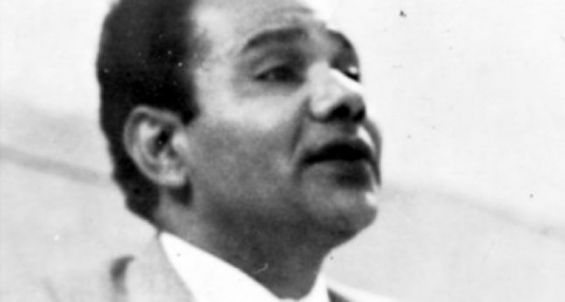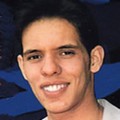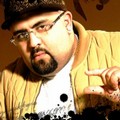42 years ago, the Moroccan political scene lost one of the most active figures. On the 18th of December, Omar Benjelloun, one of the founding fathers of the USFP political party, was assassinated in front of his home in Casablanca. A turning point in the history of Morocco that is to be commemorated today. Rendering homage to the militant, lawyer, journalist, engineer and trade union activist, Yabiladi recalls the important and significant moments in Benjelloun’s life.
Early life
Son of a retired clerk working fot the national railway operator, Omar Benjelloun was born in 1936 in Berguent, Oujda. After completing middle and high school, the young man left Morocco for France. It is in the French capital that young Omar started showing interest in politics. According to an archive document written by the Socialist Union of Popular Forces (USFP), Omar settled down in Paris in 1957, the same year that witnessed the reinforcement of the National Union of Moroccan Students (UNEM), a syndicate union created by Moroccan students in 1956.
During the same year, Omar was regarded among Moroccan students in France as an active member of the union. «He was trusted for his sincerity, integrity, commitment and his great ability to learn», wrote the same document.

He was one of the activists at the time who denounced the inefficiency of the Istiqlal party, calling for the creation of new coalitions and federations that would be independent from the party. And as history tells us, thus was created the UNFP, a socialist political party established in 1959 after splitting from the Istiqlal. Based on the biography compiled by the USFP, Omar Benjelloun was one of the main organizers of the 25th of January General Assembly which was attended in Paris by young Moroccan students who, consequently opposed the policy of the leading indepence Istiqlal political party. The assembly, which was later transformed into a movement, led to the creation of the UNFP.
Back to Morocco
A year later, Omar returned home with a degree in telecommunications and law and joined an office as regional director in telecommunications in Casablanca. That was another start for the Berguest-native who beside his job as an engineer was committed to serve as a trade union activist. Based on the same document, Omar Benjelloun was kidnapped after he, along with other employees who worked with him, conducted a strike denouncing the conditions of their work during New Year’s Eve in Casablanca.
It was not the last time that the young man would be subject to such a treatment. In May 1962, Benjelloun participated to the second congress of the National Union of Popular Forces (UNFP) and was elected member of the party’s administrative commission. Nine months later, he was arrested and tortured for one day when attending the third congress of the Moroccan Worker’s Union (UMT), one of the oldest nationwide trade unions in Morocco.

According to his biography, during his visit to Casablanca on the 16th of July 1963 to attend a session of the UNFP National Council, Omar Benjelloun was arrested alongside other militants of the same party. Tried in Rabat in 1964, Omar was sentenced to death and later pardoned in 1965. He was again arrested on March the 15th, 1966 and sentenced to six months in prison.
On the 9th of June of the same year, the political militant was sentenced to one year in prison and a fine. Seven years later, he was tried in a military court in Kenitra.
Despite his controversial biography, Omar Benjelloun held several positions in the political scene in the Kingdom. He was editor of the UNFP’s newspaper, Al Mouharir and a member of the party’s political bureau.
Omar's murdered
In 1975, and most precisely on the 18th of December, the 37-year-old activist was stabbed to death by a man in front of his house in Casablanca. Speculations occurred later, accusing the Chabiba Islamia, a violent clandestine and extremist Moroccan Islamist group founded in 1969 by Abdelkrim Motii and Kamal Ibrahim.
According to the book «Islamist Opposition in Authoritarian Regimes : The Party of Justice and Develoment in Morocco» (2011) by Eva Wegner, a professor at the School of Politics and International Relations (SPIRe) at University College Dublin, the organization was implicated in the assassination of Omar Benjelloun. «After the implication of some members in the 1975 assassination of Omar Benjelloun, editor of the Socialist Party newspaper and prominent Moroccan Marxist intellectual, the organization was banned and officially dissolved in 1976», said the same author.

One of the suspects in this story was Abdelkrim Mutii, the founding father of the Chabiba Islamia and this account was confirmed by Eva Wegner who wrote that «Mutii fled the country and was in absentia condemned to a life sentence, the militants of the organization were prosecuted».
In a different source, Azzedine Layachi, an Associate Professor of Political Science at St. John's University, New York, explained in his paper «Militant Islam in Morocco : The Perils of Exclusin and the Risks of Inclusion», that «Abdelkrim Mut'i has been living in exile - probably in Belgium - since December 1975, around the time of the assassination of Omar Ben Jelloun»
«The government accused theJam'iyat al-Shabiba al-Islamiyyaof Mut'i of having committed his murder».
Accounts differ now about where, Motii lives whether in Lybia, London or Saudi Arabia, however, everybody including Benjelloun’s family is recalling today the story that marked the 70s the most in the Kingdom. Speaking to Yabiladi, Omar Benjelloun, the nephew, was there to pay tribute to his uncle’s memory.
Omar Bendjelloun the nephew
Commenting on the assassination of his uncle, Bendjelloun declared that «the whole truth was not fully revealed because first from a material point of view, there were documents and exhibits that were destroyed or removed from the file, according to the testimony of Mr. Berrada.»
According to him «even King Hassan II at the time summoned Dr. El Khatib, founder of the PJD, to explain to him why his name was mentioned in this case». Regarding Motii, Bendjelloun told Yabiladi, that the latter fled to «Saudi Arabia, then to Libya and finally to London where no extradition procedure was established».
Although he was regarded as a left-wing politician, Omar Benjelloun held a great interest in the Sahara conflict and the Palestinian cause. According to his nephew :
«One of the greatest victories of a martyr like Omar Benjelloun is that Moroccans started considering the Palestinian cause as a national one. The proof is the 200,000 people who protested against Donald Trump's decision. One million people marched in Rabat in 2000 during the war against Palestine, which outnumbered the support rallies held in Istanbul or Jakarta ... These are examples that pay tribute to the memory of the deceased and his pro-Palestinian actions».

The lawyer and PhD researcher also spoke about his uncle and the heritage he left for the family in particular and the Kingdom in general. «I was named after my uncle by my father (Ahmed Benjelloun), who had this idea before my birth in 1976», said Omar Bendjelloun.
«The tradition continued with other militants from the party in the period between 1965 and 1966, they have all named their first borns after my uncle.»
Commemorating the assassination of the militant, Omar Benjelloun told Yabiladi that every year lectures and political meetings were held in his parents' house. «When my father was detained, meetings for the support of the Palestinian cause were held in my place, trade union activists and politicians used to visit us on a daily basis», said the lawyer who grew up in an environment that was filled with principles and political doctrines.
«It is a memory that has shaped my political and intellectual consciousness from a young age», said Benjelloun who insisted saying : «I had to understand who was who and who was doing what. Omar Benjelloun and Mehdi Ben Barka have been present in my mind since my early childhood.»
The memory of the Omar Benjelloun is indeed still remembered by the Moroccan political actors and one of them is the Federation of the Democratic Left whose members are organizing a gathering today in Rabat in front of the Parliament to commemorate the assassination of Morocco’s Omar Benjelloun.





 chargement...
chargement...













